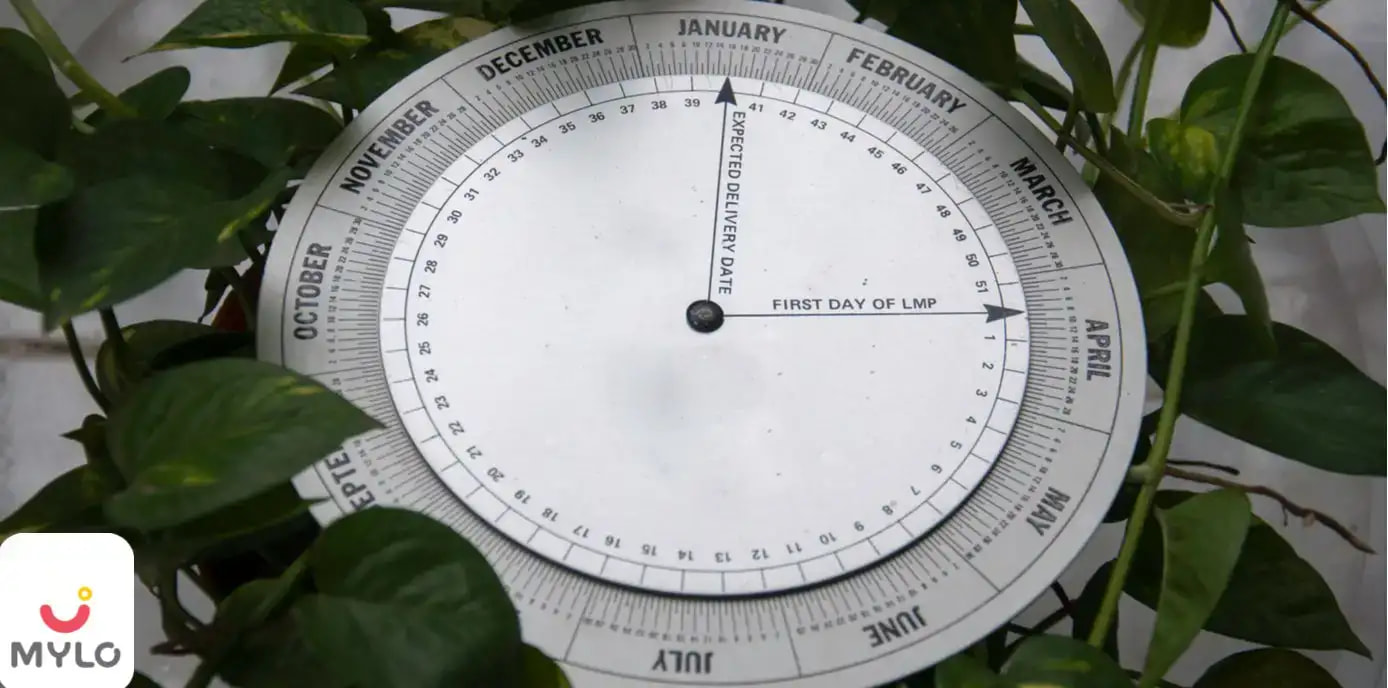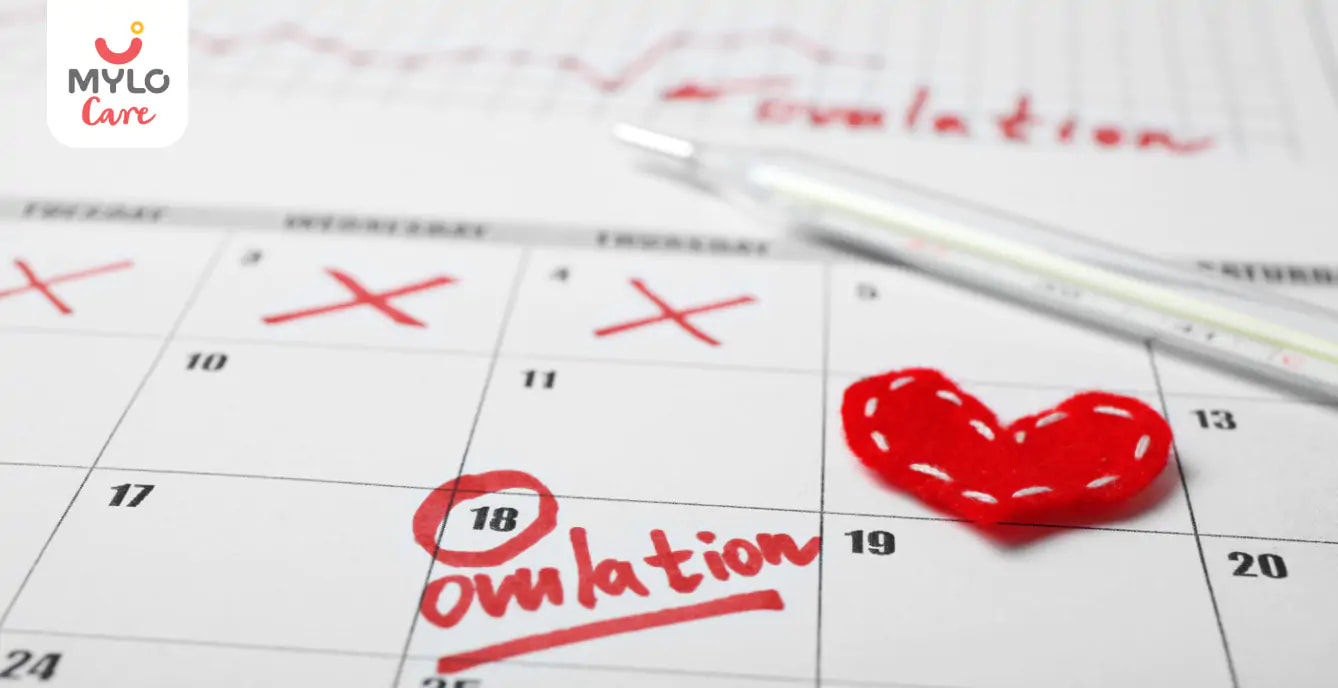Home

Due Date

How to Determine Pregnancy Due Date with Irregular Periods?
In this Article

Due Date
How to Determine Pregnancy Due Date with Irregular Periods?
Updated on 3 November 2023
Planning a pregnancy with irregular periods makes it difficult to predict the due date accurately, even with an online calculator. Instead, try these simple steps given below.
Introduction
When a woman has an irregular menstrual cycle, it is difficult to determine the date of conception and thus the due date. A woman can conceive at any time in her monthly cycle. The due date is calculated from the first day of the last menstrual period or LMP. This is because it is assumed that conception takes place about 14 days after the first day of the LMP.
The standard way to calculate a due date for an irregular menstrual cycle is to use a pregnancy calculator that considers “cycle length.”
There are many ways to determine when a woman's LMP was, including looking at past periods on calendars or keeping a journal of menstruation. The easiest way to find out when a woman's LMP was is by using an ovulation calculator. This simple program will help you try different dates until it finds the one that matches your cycles. Here are a few simple steps for you to calculate your pregnancy due date despite irregular periods.
How to calculate your due date?
Pregnancy, due date calculation, is an important part of pregnancy and childbirth. Calculating the due date can help you know the approximate time for delivery, which is important for prenatal care.
The due date is calculated by adding 280 days to the first day of your last menstrual period. This roughly estimates 40 weeks. If your menstrual periods are irregular, it may be difficult to calculate the due pregnancy date. You can use an online calculator to calculate your pregnancy due date. Due dates are calculated on the date of your last period instead of conception.
Still, if you cannot calculate your due date, an ultrasound can help you determine it. The best timing for an ultrasound is 8 weeks and 13 weeks. Let's see each step in a detailed manner to gain more clarity.
1. Calculate using your LMP (last menstrual period)
This is the most commonly used method and is accurate. It can be calculated by taking your period's start date into account and adding 280 days to it. This is the typical length of your pregnancy.
There is also a formula to calculate how far you are:
Days since start of LMP ÷ 7
2. Calculate using a dating ultrasound
A dating ultrasound is the most precise method to calculate your due date.
It measures the length of the fetus from crown to rump to estimate your due date or how far you are if it is completed within the first trimester. If you have irregular periods and face difficulty determining your last due date, you can simply go for a dating ultrasound to better analyze your due date.
3. Calculate using a pregnancy test with weeks indicator
Some pregnancy test indicators have a great feature of weeks indicator.
This can be super useful to you to determine how far you are. They detect your pregnancy by the presence of hormone hCG in urine and then state how many weeks pregnant you are.
By deducting the value from 40 weeks, you can estimate your due date roughly.
Determining Ovulation
The first step to determining your cycle dates is to figure out when you ovulate. It’s not always easy to pinpoint ovulation. However, you should at least be able to identify the time of your cycle that is most likely to be ovulation. You can do this by keeping track of the days between your periods. Once you know the approximate number of days between your periods, subtract 14 from that number and keep track of the day on which it lands. For example, if your cycle lasts 36 days, ovulation will likely occur on day 22 or 23.
Determine Fertilization Date
One of the first steps to understanding your cycle is determining when you ovulate. Ovulation is a process that occurs during the middle of your cycle. This usually happens around Day 14. You need to track your menstrual cycles for a few months to determine this. When recording these periods, make sure they are recorded on the same day each month. Once you have a consistent recording, it will be easier to understand what pattern your body follows.
Another way to identify ovulation is by taking your basal temperature every morning for three days before and after ovulation. If you notice a dip in temperature, it means ovulation has occurred, and the fertile window has opened. If you have irregular periods, ovulation may not always occur on Day 14 but instead around Day 16. This can happen if your period cycles vary in length from one month to another. Use an ovulation calculator to determine when ovulation occurs for irregular periods.
Summary
This article explains how to determine your pregnancy due date with irregular periods. While it’s not always a straightforward process, you can get a sense of when you may be expecting a little one with the proper knowledge and understanding.



Written by
Priyanka Verma
Priyanka is an experienced editor & content writer with great attention to detail. Mother to an 11-year-old, she's a ski
Read MoreGet baby's diet chart, and growth tips

Related Articles
Related Questions
Hello frnds..still no pain...doctor said head fix nhi hua hai..bt vagina me pain hai aur back pain bhi... anyone having same issues??

Kon kon c chije aisi hai jo pregnancy mei gas acidity jalan karti hain... Koi btayega plz bcz mujhe aksar khane ke baad hi samagh aata hai ki is chij se gas acidity jalan ho gyi hai. Please share your knowledge

I am 13 week pregnancy. Anyone having Storione-xt tablet. It better to have morning or night ???

Hlo to be moms....i hv a query...in my 9.5 wk i feel body joint pain like in ankle, knee, wrist, shoulder, toes....pain intensity is high...i cnt sleep....what should i do pls help....cn i cosult my doc.

Influenza and boostrix injection kisiko laga hai kya 8 month pregnancy me and q lagta hai ye plz reply me

Related Topics
RECENTLY PUBLISHED ARTICLES
our most recent articles

Diet & Nutrition
গর্ভাবস্থায় আলুবোখরা: উপকারিতা ও ঝুঁকি | Prunes During Pregnancy: Benefits & Risks in Bengali

Diet & Nutrition
গর্ভাবস্থায় হিং | ঝুঁকি, সুবিধা এবং অন্যান্য চিকিৎসা | Hing During Pregnancy | Risks, Benefits & Other Treatments in Bengali

Women Specific Issues
স্তনের উপর সাদা দাগ: লক্ষণ, কারণ এবং চিকিৎসা | White Spots on Nipple: Causes, Symptoms, and Treatments in Bengali

Diet & Nutrition
গর্ভাবস্থায় পোহা: উপকারিতা, ধরণ এবং রেসিপি | Poha During Pregnancy: Benefits, Types & Recipes in Bengali

Diet & Nutrition
গর্ভাবস্থায় মাছ: উপকারিতা এবং ঝুঁকি | Fish In Pregnancy: Benefits and Risks in Bengali

Diet & Nutrition
গর্ভাবস্থায় রেড ওয়াইন: পার্শ্ব প্রতিক্রিয়া এবং নির্দেশিকা | Red Wine During Pregnancy: Side Effects & Guidelines in Bengali
- ইনার থাই চ্যাফিং: কারণ, উপসর্গ এবং চিকিৎসা | Inner Thigh Chafing: Causes, Symptoms & Treatment in Bengali
- গর্ভাবস্থায় ব্রাউন রাইস: উপকারিতা ও সতর্কতা | Brown Rice During Pregnancy: Benefits & Precautions in Bengali
- Velamentous Cord Insertion - Precautions, Results & Safety
- Unlock the Secret to Flawless Skin: 7 Must-Have Qualities in a Face Serum
- Unlock the Secret to Radiant Skin: How Vitamin C Serum Can Transform Your Complexion
- Gender No Bar: 10 Reasons Why Everyone Needs a Body Lotion
- Unlock the Secret to Radiant Skin How to Choose the Perfect Body Lotion for Your Skin Type
- Top 10 Reasons to Apply a Body Lotion After Every Bath
- Communication in Toddlers: Milestones & Activities
- How to Improve Vocabulary for Toddlers?
- A Comprehensive Guide to Understanding Placenta Accreta
- Vulvovaginitis in Toddlers Causes, Symptoms and Treatment
- A Comprehensive Guide to Understanding Cerebral Palsy in Children
- Bitter Taste in Mouth During Pregnancy: Understanding the Causes and Remedies


AWARDS AND RECOGNITION

Mylo wins Forbes D2C Disruptor award

Mylo wins The Economic Times Promising Brands 2022
AS SEEN IN

- Mylo Care: Effective and science-backed personal care and wellness solutions for a joyful you.
- Mylo Baby: Science-backed, gentle and effective personal care & hygiene range for your little one.
- Mylo Community: Trusted and empathetic community of 10mn+ parents and experts.
Product Categories
baby carrier | baby soap | baby wipes | stretch marks cream | baby cream | baby shampoo | baby massage oil | baby hair oil | stretch marks oil | baby body wash | baby powder | baby lotion | diaper rash cream | newborn diapers | teether | baby kajal | baby diapers | cloth diapers |








